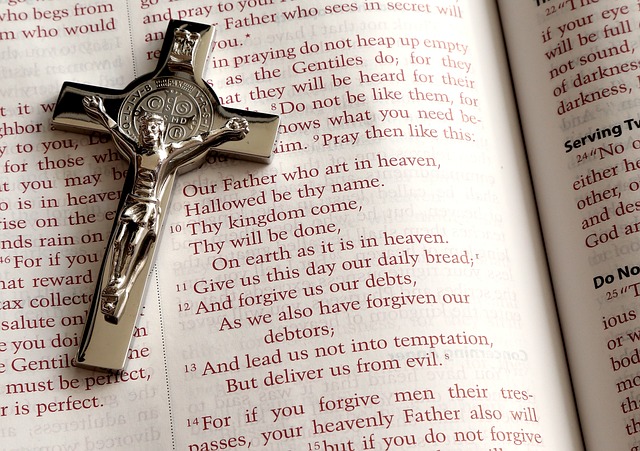The Bible’s Answer
Those who say yes to this question say that the essence of God is neither male nor female. This is correct, because in the book of Genesis, God creates both men and women in his image (Gen 1:27). This means that, mysteriously, God is beyond both maleness and femaleness, just as God is beyond everything else in all of creation. Those who say yes might also say that since God is beyond gender, it is simply a matter of choice whether we call him “Father” or “Mother”, and that calling God “Mother” could allow women to feel more included in church. This is the point of controversy. As with all questions of faith, the question must not be whether or not this is convenient for us, or appealing, but rather “is this true?”
How Jesus Instructs Us to Refer to God
First, let’s turn to our only Master and Lord, Jesus Christ (Jude 4–5), for his guidance on this matter. In the Gospel of Luke, one of Jesus’ disciples asks him, “Lord, teach us to pray, as John taught his disciples” (Luke 11:1, ESVUK). This is Jesus’ answer to him:
2 … When you pray, say: “Father, hallowed be your name. Your kingdom come. 3 Give us each day our daily bread, 4 and forgive us our sins, for we ourselves forgive everyone who is indebted to us. And lead us not into temptation. (Luke 11:2–4)
Prayer is how we talk to and address God. Jesus teaches us that the proper way to address his heavenly Father is as “Father”. We are to address God as a kind and loving Father who is holy, and who loves us, provides for us, guides us on the right path, and forgives us of our wrongdoings. Some might reply: but doesn’t Scripture also refer to God in motherly ways? Scripture certainly does. For example, Isaiah compares God’s love for Israel to a nursing mother, but says that God’s love is even stronger:
Can a woman forget her nursing child, that she should have no compassion on the son of her womb? Even these may forget, yet I will not forget you. (Isaiah 49:15)
Yet while God does have motherly qualities in this passage and many others, it does not ever call him “Mother”. It’s important to note that if he wanted to, Jesus could have instructed us to call God our Mother, or some other term; but he did not. There is zero evidence to suggest that Jesus did not do so merely because of his cultural situation (since Jesus did many counter-cultural things during his ministry, such as talking with the woman at the well (John 4:27), etc.).
What this means is that it is perfectly fine and biblical to call God Father. It’s how God has revealed himself to humanity and is a command of the Lord Jesus himself. But to call God Mother, one has to go beyond Scripture, and assume that it’s okay—in other words, to rely on human wisdom rather than God’s wisdom. The danger in doing so is that we end up doing what the Pharisees did, which was teaching as doctrines the commandments of humans, at the expense of the commandment of God:
6 And he said to them, “Well did Isaiah prophesy of you hypocrites, as it is written,
“‘This people honours me with their lips, but their heart is far from me; 7 in vain do they worship me, teaching as doctrines the commandments of men.’ 8 You leave the commandment of God and hold to the tradition of men.”
9 And he said to them, “You have a fine way of rejecting the commandment of God in order to establish your tradition! (Mark 7:6–9)
God’s Name Matters
It is also worth taking into account that in the prayer that Jesus taught us to pray, Jesus tells us to pray that God’s name be “hallowed”, or made holy (Lk 11:2). This means that God’s name is important and that how we use it matters. When commissioning the Eleven apostles for ministry, Jesus revealed to us God’s holy name. This was when he told his disciples to baptise people “in the name of the Father and of the Son and of the Holy Spirit“:
19 Go therefore and make disciples of all nations, baptizing them in the name of the Father and of the Son and of the Holy Spirit, 20 teaching them to observe all that I have commanded you. (Matthew 19:19–20)
According to Jesus, the name of God is “the Father, the Son, and the Holy Spirit”, and this is the name into which we are baptised, and the name by which we receive all the blessings and security of the Christian life (Rm 6:3–5).
Throughout the Bible, the name of God is a significant topic. God blessed the people of Israel by placing his name upon them (Nu 6:27). God’s place of worship was only where he made his name dwell (Deut 12:4–6, 10–11, 21). We are to trust in the name of the Lord (Ps 20:7), call upon the Lord’s name in worship (Ps 116:13, 17), and are promised that those who call on the name of the Lord will be saved (Jl 2:32)—a promise which is repeated in the New Testament, with reference to Jesus (Rm 10:9–12, 13). In fact, the name of the Lord and the Lord himself are one and the same (1Ch 22:7, 10, 19), which means that God is not simply called “Father, Son, and Spirit”, he is the Father, the Son, and the Holy Spirit.
If we would not change the formula of Baptism, because doing so would render it invalid, why would we treat the way we address or pray to God any differently? If changing the name of God to “Mother” in Baptism would invalidate the Sacrament, then changing the name of God to “Mother” in prayer, or calling him “our Father and Mother”, would also bring many similar problems and uncertainties.
One of the problems it raises is that we are failing to honour God by calling him “Mother”, because he has specifically told us to call him “Father”. Another problem it raises is that we are failing to treat God’s name as holy by doing so. One other problem is that calling God “Mother” cannot be done with a clear conscience, because it is not biblical. So, those who do so will have uncertainties and doubts in their prayers, and St Paul says that “whatever does not proceed from faith is sin” (Rm 14:23). Of course, if they are prideful, they may not have doubts, yet pride is also a hindrance to prayer (1Pt 5:5–7).
“Father” Is Not a Metaphor
Some might argue by saying that when the Bible calls God “Father”, it’s only doing so “metaphorically”. That is, it’s using symbolic human terms to describe a deeper reality. This means that if the times change, and it becomes more meaningful to call God something else, we could call God “Mother” or “Parent” instead of “Father”, or in addition to Father. The issue with this argument? God has revealed himself to humanity as the Father. It’s a revelation, not a metaphor. From all eternity, God has always been the Father of our Lord Jesus Christ, present with the Holy Spirit:
All things have been handed over to me by my Father, and no one knows the Son except the Father, and no one knows the Father except the Son and anyone to whom the Son chooses to reveal him. (Matthew 11:27)
Blessed be the God and Father of our Lord Jesus Christ, the Father of mercies and God of all comfort, … (2 Corinthians 1:3)
For it is not you who speak, but the Spirit of your Father speaking through you. (Matthew 10:20)
… 2 the life was made manifest, and we have seen it, and testify to it and proclaim to you the eternal life, which was with the Father and was made manifest to us— 3 that which we have seen and heard we proclaim also to you, so that you too may have fellowship with us; and indeed our fellowship is with the Father and with his Son Jesus Christ. (1 John 1:1–3)
God has revealed himself as Father. It is difficult to maintain that those who speak of him as Mother are still speaking of the same God. Claiming that it’s only a metaphor when the Bible calls God “the Father of our Lord Jesus Christ”, or the Holy Spirit “the Spirit of your Father”, is worse than simply removing or changing a name or title of God. It’s messing with who God actually is.
It denies how Scripture identifies and reveals God, and instead gives us a man-made identification. The disturbing thing is that while this might not in every case be a denial of the Holy Trinity, it undermines one of the central tenants of the Trinity, which is that the Father, Son, and Holy Spirit have always been the Father, Son, and Holy Spirit from all eternity. Thus, by messing with the nature of God, it paves the way for not only undermining, but outright denying the Holy Trinity.
This is the antichrist, he who denies the Father and the Son. (1 John 2:22b)
To Which God Are We Praying?
Finally, calling God “Mother”, as well as referring to him in feminine pronouns (she, her, herself), raises the question: to which God is the person actually praying? If a pastor leading a church, for example, stands up at the front and prays a prayer to “our Heavenly Mother”, many of the people in the congregation will wonder, “Hang on a minute … Is this a prayer to the true God, or to some pagan goddess deity?” They will wonder this, because nowhere in the Bible is God called our Heavenly Mother. Furthermore, in biblical times, there were pagan goddesses that the Gentiles and faithless Israelites worshipped, such as the Asherah (1Ki 15:13; 16:33; Jer 44:25–27), yet the faithful of Israel continued to refer to God in masculine terms despite this (Is 63:16; Jer 10:10; Hos 2:16).
So, praying to God as “Mother”, or referring to him as “she”, creates confusion among people, and brings doubts about whether this prayer is really to God, or to a pagan deity. Disturbingly, this means that those who invoke “Heavenly Mother” in prayer could be praying to a demon, and not to the true God, since false “gods” or idols are demons (1Cor 10:19–22). We should not do whatever is right in our own eyes, but only what the Lord commands us.
8 “You shall not do according to all that we are doing here today, everyone doing whatever is right in his own eyes, 9 for you have not as yet come to the rest and to the inheritance that the Lord your God is giving you. … 32 “Everything that I command you, you shall be careful to do. You shall not add to it or take from it. (Deuteronomy 12:8–9, 32)
Conclusion
When we look at the Bible’s teachings, it becomes clear that we do not have the right to call God whatever we want, but rather we are to address him in the way that he has revealed and commanded. So, the Bible’s answer to this question is: no, we cannot call God Mother, because God has instructed us on what we can call him, and “Mother” is not one of them.
Of course, it’s important that Christian women are honoured and that they feel valued in the Christian life and their relationship with God. But the Church can do this by teaching and promoting God’s motherly and feminine qualities, rather than by changing the way it addresses God, and doing so in a way contrary to what he has revealed and commanded. We would do well to heed Paul’s words seriously:
3 For the time is coming when people will not endure sound teaching, but having itching ears they will accumulate for themselves teachers to suit their own passions, 4 and will turn away from listening to the truth and wander off into myths. (2 Timothy 4:3–4)
See Also






